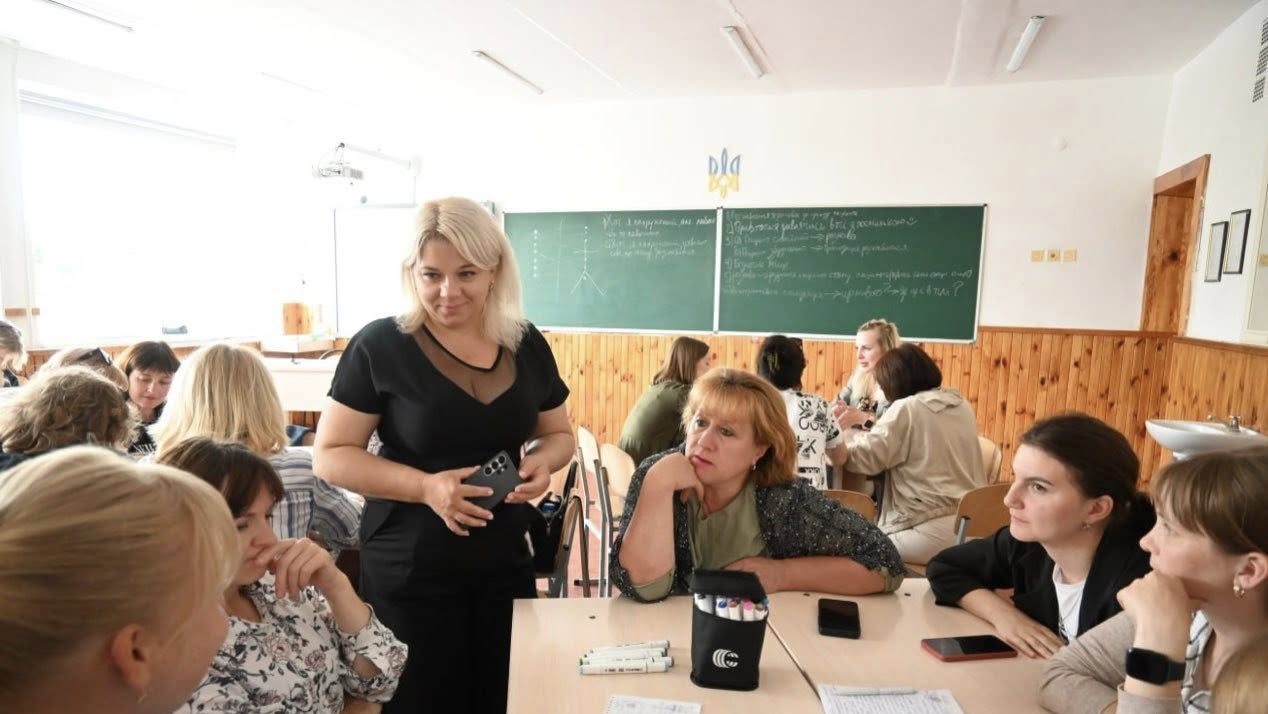Continuing the Neuropsychological Desensitization Training
Building on our foundational Day 1 (covered in a previous article), the National Council of Psychologists of Ukraine pressed ahead in Baranivka from June 24–27, 2025, refining trauma-care skills for psychologists, educators, medical staff, and social workers across the Zhytomyr Oblast.
Day 2: From Theory to Practice—Bilateral Stimulation & Somatic Techniques
Participants immersed themselves in hands-on methods designed to stabilize trauma responses and foster self-regulation:
– “Butterfly” Technique: a gentle, yet potent, bilateral self-stimulation
– Image-Based Work: drawing trauma scenes, transforming symbols, identifying personal resources
– Body-Centered Exercises: grounding practices, “3-2-1 STOP” breathing, and the “Resource Touch”
– Creative Visualization: illustrating “My Place of Power” to anchor inner calm
– EFT (Emotional Freedom Techniques): tapping sequences for self-administered relief
– Dyadic Simulations: peer-to-peer therapy role-plays with feedback
By day’s end, trainees had felt tangible shifts in their bodies, deepened trust in the methods, and sharpened their ability to guide clients toward inner balance.
Ongoing Support: Trauma Care for Patients
Concurrently, Angels for Ukraine’s Ukrainian–French teams began individual and small-group sessions with wounded servicemen at Baranivka hospitals:
– Holistic Focus: addressing both physical injuries and psychological wounds
– Cultural Sensitivity: building trust and ensuring confidentiality
– Somatic Reconnection: exercises to reduce stress and reclaim bodily agency
This outreach underscores our conviction that every defender deserves comprehensive healing for body and soul.
Day 3: Customizing Interventions for Diverse War-Affected Groups
Shifting focus to specialized populations, day three tackled adaptations for:
– Children & Adolescents: play-based desensitization
– Veterans with Non-Verbal PTSD: symbol-driven stabilization
– Military Families: ritual and body-work to strengthen bonds
– Survivors of Occupation & Violence: autonomy-restoring somatic practices
Working in small teams, participants built client “portraits,” crafted bespoke intervention plans, and rehearsed culturally attuned techniques—emerging with tailored strategies ready for immediate use.
Day 4: From Concept to Community—Project Design Workshop
On day four, attendees formed four cross-disciplinary groups to blueprint local implementation projects:
1. Needs Assessment: defining target audiences and mapping community resources
2. Session Modeling: selecting techniques, formats, and sustainability measures
3. Mini-Presentations: pitching pilot projects, fielding peer and trainer feedback
4. Refinement: integrating suggestions to bolster feasibility and impact
This collaborative laboratory fostered critical thinking, creativity, and mutual support—key drivers for scalable, community-rooted trauma care.
Day 5: Integration & Launch—Practice-Ready Implementation
The closing day wove theory, practice, and design into actionable plans. Under the mentorship of Vita Dzhendera, Vice-Chair of the National Council of Psychologists, groups:
– Finalized project templates for veterans, children, IDPs, and military families
– Conducted role-play “rehearsals” to troubleshoot logistics and client engagement
– Delivered polished presentations, cementing confidence to launch initiatives
Participants departed with a clear roadmap: tomorrow, they’ll begin healing real lives with proven neuropsychological tools.
—
International Synergy: Elevating Local Practice
Our French colleagues—Eva Dzieduszycka and Dr. Jean-Marie Deschan—have been instrumental throughout, pairing global expertise with Ukrainian insights. This cross-border exchange ensures trauma-therapy methods remain both cutting-edge and deeply attuned to local needs.
What’s Next?
– Regional Rollouts of the “Strength in Silence” program
– Ongoing Mentorship: virtual clinics to support project teams
– Resource Hub Launch: downloadable workbooks, demonstration videos, and toolkits
Together with international partners, local councils, and every dedicated trainee, we’re knitting a resilient network of trauma-care champions across Ukraine. In the quiet between breaths, we find strength.
We stand with Ukraine. We heal in silence. We grow in solidarity.

